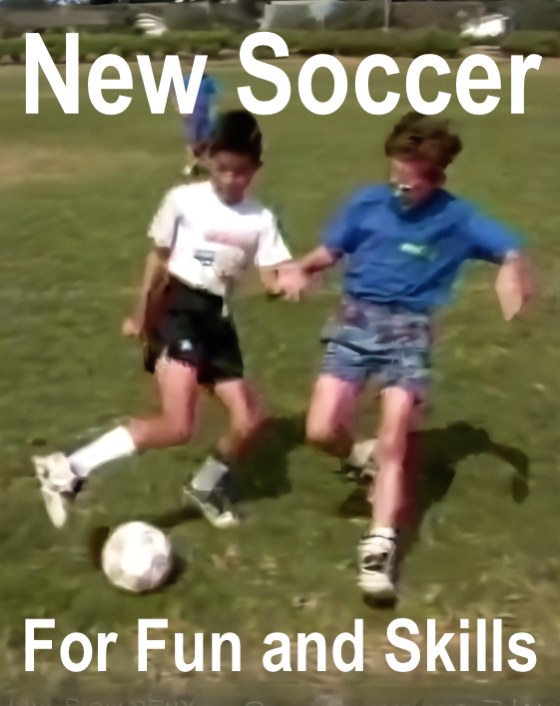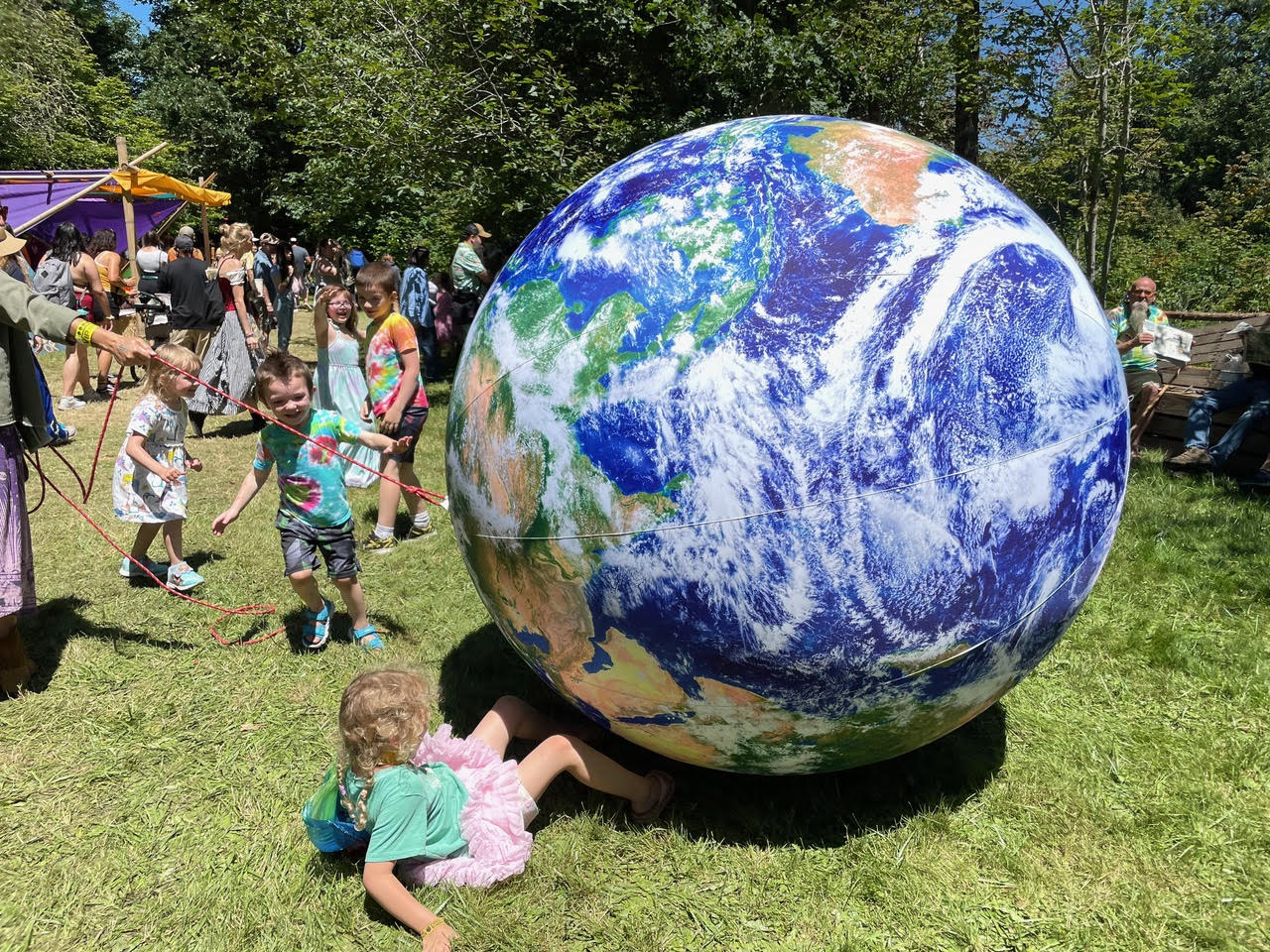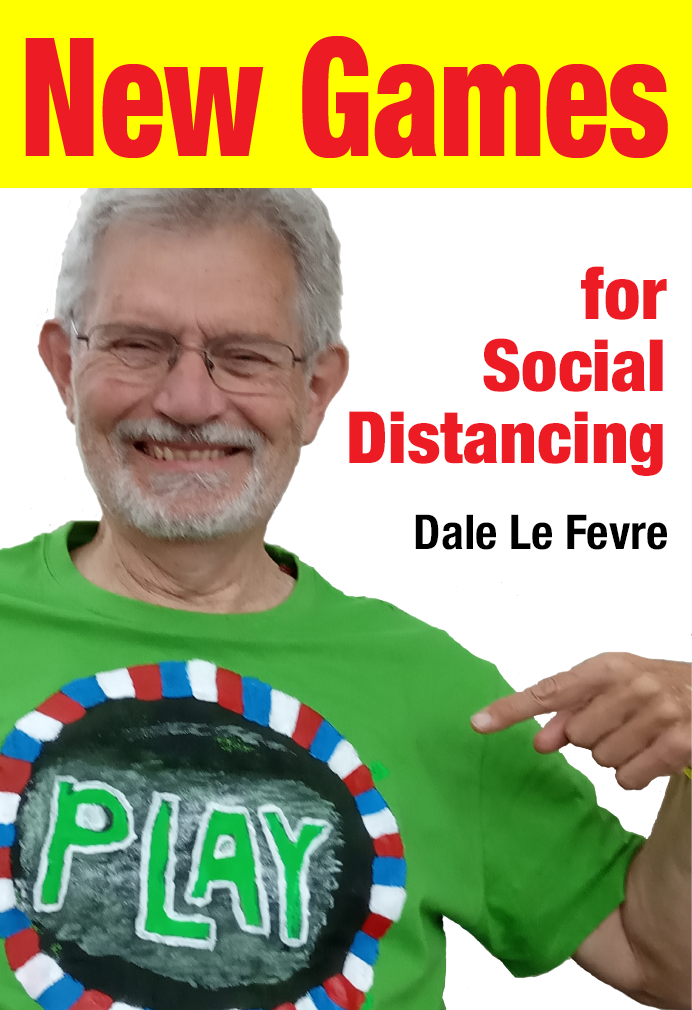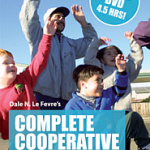Transcript:
Hi, I’m Dale LeFevre
I’m John Allsopp, obviously you know Dale but I’m a marketer, that’s my involvement here
We were talking about New Games and the first question really is “what are New Games”?
Fortunately, that’s the easiest question to answer. New Games are co-operative group games for all ages, sizes and abilities. Anybody can play New Games, that’s because the games are adapted to the people rather than the people having to adapt to the game.
Non-competitive, is that a good word for them?
Well no
Good, I’m glad we got this sorted
They are co-operative games and I say that because some of the games do include competition, it just doesn’t matter who wins, so they are not strictly non-competitive. Some games are just a group challenge so they are not really a competition, just something for the group to solve, but a lot of them do include competition but instead of say when you’re caught you’re ‘out’ which is really boring, you have to wait for the whole game to be played and you’re just sitting there, especially if you’re one of the first ones out, what happens is you change roles and you keep playing, in other words you may be part of the other team if you get caught, or instead of a swimmer you are maybe an octopus, it just depends on the game, but you’re still in .. if you want to be. Now some people say “I don’t want to play just now” and that’s fine, we don’t force anybody to play it’s just available for anybody who wants to be in, it doesn’t matter if you are in a wheelchair or on crutches, whatever, we can change the game to suit the players.
So, if you can remember, I mean how long have you been doing this?
A loonng time! Since 1975, so it’s 43 years, actually in February.
Wow, so can you remember what peaked your initial interest, what was it that got you into it?
Yes, I remember exactly
I’m so glad
I’d just left my previous job and I was looking for something that I would enjoy doing that I’d like better than the thing I had, that was my rule of thumb, if I moved on I moved on to something better, I was just watching a programme called Make A Wish on television and they had a segment on New Games and when I saw it I said “that’s what I want to do”. It didn’t instantly happen, but I called ABC Television in New York and they told me who to get in touch with, the producer of the programme he gave me the address of the folks and I wrote a letter and it took a couple of months but a couple of months later I got a phone call and they said ‘would you like to come and train with us?’ and I said ‘”YES!” So a week later I packed up some stuff and caught a ride out to California (I was living on the east coast then) and I’ve been doing it ever since. February 1975.
Excellent, and the life is, apart from delivering New Games and running workshops and so on, it’s collecting and discovering and nurturing new ideas for new games, what’s that all about? Where do you get ideas for new games?
Well, from people who come to my workshops, frankly. There are sections in the workshop where people present games themselves and we give them feedback, we try to keep it positive, what did people like about the way the person presented the game, and then maybe what might they do differently. It’s not necessarily a criticism but maybe just an alternative way of doing a thing. And people bring new games that I’ve never seen before and I’m like “hmmm, I think I’ll add that to my repertoire”, so it’s grown as I’ve travelled round and just experienced other people’s games.
So we’ll talk about what defines a New Game in another video, but we’ve had some feedback as well, Carol Zakaluk says New Games are fantastically fun but how do you entice people over the initial barrier? I’m one of those people who would hang around at the back and not join in and enjoy it all separately.
Good question, well almost invariably, most groups I do the games with, I walk into the room and everyone’s a bit stiff and nervous and I enjoy that moment because I know that within about 5 minutes they are going to be very much different and you have to get them past that barrier somehow, I’ll give an example. I went to, either Buffalo or Rochester, New York and I was supposed to do the games with a group of teenagers and they were all sitting on these bleachers and I came in, I was introduced and I said “OK, come on down we’re going to do some games” and nobody moved! “O K”. So I just got real. I said “look, I’ve travelled an awful long way to be here with you, just try one game. If you don’t like it you can go back to just sitting down.” So they were like “OK, fine, fair enough”, they did come down and they tried one game and after that they were very enthusiastic. You have to do something to get them past that. Whatever it is, you might have to do something spontaneous, that was very spontaneous, but just to “oh, you know, just try it” because once they do often the most resistant, the most sceptical are the most enthusiastic afterwards.
Absolutely. Another question from Rebecca Hodges, she asks “can you use New Games for all sorts of age groups”, and obviously I know you do a lot of work with schools so perhaps she’s thinking of people as they get older.
That I’m aware of, I’ve had people in New Games that are in their 90s and as young as perhaps one and a half or two, although once you get below about 4 years old you really need an adult there because the kids are like “la la, what’s going on” and you’re “get in a circle” and they’re “what’s a circle?” So they need a little bit of guidance to be a part of the thing. For my first session for older folks, I thought I’ve got six games that definitely would work and another six that “hmmm, not sure” and then all the others, so I did the six that I thought would work and they did and that was fine and I tried the other six and I just thought “well, might as well try the others” and what I found was I was the one with the limitations because the people just adapted by themselves. Like if we had to move across the room and somebody was having trouble, somebody would be there to help them, just hold their hand or whatever. And instead of running we walked and that was OK, they adapted the games. That was a big learning experience for me because I was afraid for them but they weren’t afraid at all they just wanted to play and play the best way they could. So .. it works with any group, you just have to not let your own preconceptions get in the way.
Yes, I guess they had pre-selected themselves, they felt capable of joining in, if they are there, they are up for it.
Yes, that’s the main thing and that’s like with people who are resistant, if you just give it a chance, it’ll work.
Cool, so we are aiming to train people as New Games Leaders, is that the phrase we are using, ‘leaders’?
Yes
We have an event on the weekend of the 21 April in Sheffield
2018
Yes, so you should find a link near to this video, somewhere, that you can click and go and register to hear more about that, it’s not signing up to go, it’s if you want to know more about leading New Games
Is this link going to be on the end of the video, or on screen?
I might manage to get it on the video, or it might be underneath or at the side depending on what device you’re using. But yes, if you want to know more about that event then click that and we’ll send you more emails about that.


 New Soccer
New Soccer New Fully Printed Earthball
New Fully Printed Earthball New Games For Social Distancing
New Games For Social Distancing Complete Cooperative New Games (DVDs or Downloads)
Complete Cooperative New Games (DVDs or Downloads)
Follow Us